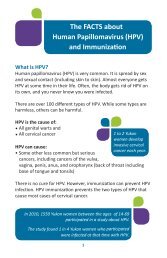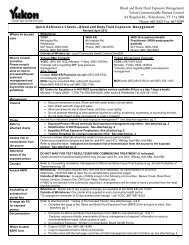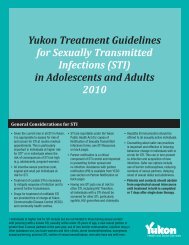Principles of Immunology - Health and Social Services
Principles of Immunology - Health and Social Services
Principles of Immunology - Health and Social Services
Create successful ePaper yourself
Turn your PDF publications into a flip-book with our unique Google optimized e-Paper software.
Community Nursing<br />
Yukon Immunization Program<br />
Section 14 - <strong>Principles</strong> <strong>of</strong> <strong>Immunology</strong><br />
2011 March<br />
Page 6<br />
1.7 ADAPTIVE IMMUNITY - “SECOND” IMMUNE DEFENCE<br />
Adaptive immunity is the second line <strong>of</strong> defence against anything recognized as non-self<br />
<strong>and</strong> it provides protection against re-exposure to the same pathogen.<br />
Characteristics <strong>of</strong> adaptive immunity:<br />
<br />
<br />
<br />
Specificity: the immune response is specific to the antigen that produced it (e.g.<br />
antibody for measles antigen has no effect on rubella antigen)<br />
Tolerance: the immune response is able to differentiate between self <strong>and</strong> nonself<br />
so that body tissues are not destroyed<br />
Memory: with subsequent exposure to an antigen there is a rapid <strong>and</strong> strong<br />
immune response. This is called an anamnestic response.<br />
Adaptive immunity is divided into two categories:<br />
Cell mediated immunity<br />
Humoral (antibody) immunity<br />
1.8 ADAPTIVE IMMUNITY - CELL MEDIATED IMMUNITY<br />
Cell mediated immunity describes any immune response where T cells have the main<br />
role.<br />
B cells are not activated by most antigens without “help” from helper T cells. The<br />
activation <strong>of</strong> T cells is an essential first stage in virtually all adaptive immune responses.<br />
This is called the “T cell-dependent immune response”.<br />
T cells do not recognize microorganisms in the extracellular fluids. Instead, T cell<br />
receptors bind to fragments <strong>of</strong> antigens (epitopes) that are presented on the surface <strong>of</strong><br />
antigen presenting cells (APC).<br />
There are three main types <strong>of</strong> APC:<br />
Macrophages<br />
Dendritic cells<br />
Naïve B cells<br />
When T cells recognize an antigen presented by the APC, they can differentiate into<br />
several different types <strong>of</strong> T cells:<br />
<br />
Cytotoxic T cells:<br />
Kill cells infected with intracellular pathogens such as viruses




![Women and Alcohol: A women's health resource [2326.26 KB ]](https://img.yumpu.com/22340649/1/190x245/women-and-alcohol-a-womens-health-resource-232626-kb-.jpg?quality=85)











